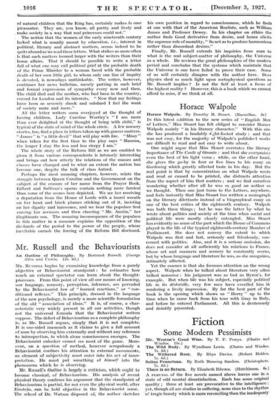Horace Walpole
Horace Walpole. By Dorothy M. Stuart. (Macmillan. 5s.) IN this latest addition to the new series of English Men of Letters," Miss Stuart has felt obliged to consider Horace Walpole mainly " in his literary character." With this aim she has produced a laudably ii_rglit-footed study : and that was not easy, for the majority of Walpole's published works are difficult to read and not easy to write about.
One might argue that Miss Stuart overrates the literary importance of The Castle of Otranto : and that she overpraises even the best of his light verse ; while, on the other hand, she gives the go-by in four or five lines to his essay on Gardening which greatly affected taste in his day. But the real point is that by concentration on what Walpole wrote and read or caused to be printed, she distracts attention from the aspect of him that matters ; and we find ourselves wondering whether after all he was SQ good an author as we thought. Then one just turns to the Letters, anywhere, and feels instantly that Miss Stuart has written a monograph on the literary dilettante instead of a biographical essay on one of the best critics of the eighteenth century. Walpole was both these things ; but he was the latter 'by what he wrote about politics and society at the time when social and political life were mostly closely entangled. Miss Stuart has evidently no sense of the part which the House of Commons played in the life of the typical eighteenth-century Member of Parliament. She does not convey the extent to which Walpole was first and last, seriously and frivolously, con- cerned with politics. Also, and it is a serious omission, she does not consider at all sufficiently his relations to France, whose art and manners and scenery he constantly scorns, but by whose language and literature he was, as she recognizes, intimately affected.
Yet the essence is that she focusses attention on the wrong aspect. Walpole when he talked about literature very often talked nonsense : his judgment was as bad as Byron's, for example. But when life was his subject, especially political life in its dishabille, very few men have excelled him in rendering a lively impression. By far the best part of the book is the opening which shows us " Horry " up to the time when he came back from his tour with Gray in Italy, and before he entered Parliament. All this is dexterously and daintily presented.










































































 Previous page
Previous page